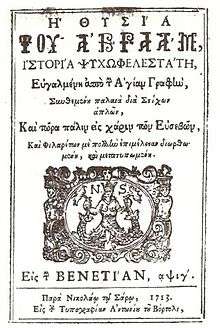Vitsentzos Kornaros
| Vitsentzos Kornaros | |
|---|---|
 Cover of The Sacrifice of Abraham by Vitsentzos Kornaros (1713 edition) | |
| Born |
Vincenzo Cornaro 1553 Trapezonda, Sitia, Kingdom of Candia |
| Died |
1613/1614 Candia, Kingdom of Candia |
| Nationality | Greek |
| Literary movement | Cretan Renaissance, Cretan literature |
Vitsentzos or Vikentios Kornaros (Greek: Βιτσέντζος or Βικέντιος Κορνάρος) or Vincenzo Cornaro (March 29, 1553 – 1613/1614) was a Cretan poet, who wrote the romantic epic poem Erotokritos. He wrote in vernacular Greek, and was a leading figure of the Cretan Renaissance.
Vitsentzos Kornaros is considered to be the greatest of all the Cretan poets and one of the most significant and influential figures in the entire course of Greek poetry. The son of a Venetian-Cretan aristocrat and a scion of the noble Venetian family of Cornaro, he was born near Sitia, Crete in 1553. Later, when he married, he came to live in Candia (now Heraklion) where he joined the Accademia dei Stravaganti. Kornaros died in 1613 (or 1614), just before his contemporaries, William Shakespeare and Miguel de Cervantes.
Biography
Not many biographic sources exist about Kornaros apart from the last verses of Erotokritos. It is believed that he was born to a wealthy family in Trapezonda (Τραπεζόντα), a village near Sitia, Crete, in 1553, and lived there roughly up to 1590. He then moved to Candia (modern Iraklion), where his marriage to Marietta Zeno took place. Together they had two daughters named Helen and Katerina.
In 1591 Kornaros became an administrator, and during the outbreak of plague from 1591 to 1593 he worked as a sanitary supervisor. He showed interest in literature and was a member of a literary group called Accademia degli Stravaganti (Academy of the Strange Ones), which was founded by his brother and fellow writer Andrea Cornaro.
He died in Candia, in 1613 (or 1614), and was buried at the church of San Francesco. The cause of his death remains unknown.
Alternate spellings of his first name include Vicenzo and Vitzentzos.
Kornaros' "Erotokritos" was a source of inspiration for Dionysios Solomos and influenced Greek poets such as Kostis Palamas, Krystallis and Seferis.
His legacy
After him named:
- A square in Heraklion and...
- A ferryboat, connecting the Greek islands Kythera and Antikythera with Crete, the Peloponnese and Piraeus.
References
- D. Holton, Λογοτεχνία και κοινωνία στην Κρήτη της Αναγέννησης "Literature and society in Renaissance Crete" (1991), p. 369
- L. Politis, Ιστορία της Νεοελληνικής λογοτεχνίας "History of modern Greek literature", ed. Μ.Ι.Ε.Τ. (National Bank of Greece Cultural Foundation), Athens 1978, p. 78
- K. Th. Dimaras, Ιστορία της νεοελληνικής λογοτεχνίας "History of modern Greek literature", ed. Ίκαρος, Athens 1975 (6η έκδοση), p. 81
- St. Alexiou, «Εισαγωγή» "Introduction" of Βιτσέντζος Κορνάρος, Ερωτόκριτος, ed. Ερμής, Athens 1995, p. ιστ΄–ιζ΄
External links
 Greek Wikisource has original text related to this article: Βιτσέντζος Κορνάρος
Greek Wikisource has original text related to this article: Βιτσέντζος Κορνάρος- The Cretan school of literature (Greek)